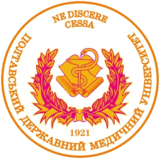Будь ласка, використовуйте цей ідентифікатор, щоб цитувати або посилатися на цей матеріал:
http://repository.pdmu.edu.ua/handle/123456789/7797| Назва: | Скринінг ранозагоювальної дії нового стоматологічного гелю на основі рослинного препарату та синтетичного антисептика |
| Інші назви: | Скрининг ранозаживляющего действия нового стоматологического геля на основе растительного препарата и синтетического антисептика Screening of Wound-Healing Action Produced by New Oral Phytogenic Antiseptic Gel |
| Автори: | Бобирьов, Віктор Миколайович Дев'яткіна, Наталія Миколаївна Ніколенко, Дмитро Євгенійович Бобырев, Виктор Николаевич Девяткина, Наталья Николаевна Николенко, Дмитрий Евгеньевич Bobyriov, V. M. Devyatkina, N. Bespala, Yu. O. Nikolenko, D. Ye. |
| Дата публікації: | 2013 |
| Видавець: | Вищий державний навчальний заклад України «Українська медична стоматологічна академія» |
| Бібліографічний опис: | Скринінг ранозагоювальної дії нового стоматологічного гелю на основі рослинного препарату та синтетичного антисептика / В. М. Бобирьов, Н. М. Дев'яткіна, Ю. О. Беспала, Д. Є. Ніколенко // Вісник проблем біології і медицини. – 2013. – Вип. 2 (100). – С. 244–244. |
| Короткий огляд (реферат): | У статті приведені результати морфологічних досліджень ранозагоювальних властивостей нового комбінованого гелю з різним вмістом діючих речовин (ротокану і триклозану) на моделі гострого травматичного ушкодження слизової оболонки порожнини рота щурів. Визначено гель з оптимальним співвідношенням активних компонентів, який є перспективним для подальшого фармакологічного дослідження; В статье приведенны результаты морфологических исследований ранозаживляющих свойств нового комбинированного геля с разным содержимым действующих вещест (ротокана и триклозана) на модели острого травматического повреждения слизистой оболочки полости рта крыс. Определен гель с оптимальным соотношением активных компонентов, который является перспективным для дальнейшего фармакологического исследования; Traumatic injuries of oral mucosa (TIOM) are commonly encountered in dental practice and dentists, oral surgeons, orthopedists and orthodontists often face them. Gels seem to be promising to cure these conditions. However the arsenal of domestic medicines manufactured in the form of gel is bounded. This has impelled the researches of Kharkiv National Pharmaceutical University to work out new oral phytogenic gel containing synthetic antiseptic. Our previous research articles presented the results of histological studying of oral mucosa in rats subjected to acute traumatic injury. This pathology modeled was the basis for searching pharmacological products which might promote more effective healing of oral mucosa. This research is aimed to determine the optimal proportion of acting agents of the newly developed gel based on the wound-healing properties in the treatment of acute mechanical traumatic injuries of oral mucosa. Materials and methods. The experiments involved 25 pubertal Wistar white rats weighed 160 - 200 g which were divided into 5 groups: the 1st - trauma + gel № 1 (test group); the 2nd - trauma + gel № 5; the 3rd group - trauma + gel № 6; the 4th - trauma + gel № 7, and the 5th - trauma + gel № 8. Acute mechanical trauma of buccal oral mucosa was modeled by ophthalmic trepan. The application of the gel started on the second day since the traumas had been induced. With the rats under general anesthesia, the injured segments were cut out and put into 10 % neutral formaldehyde solution. Microscopic sections were stained with hematoxylin and eosin. It has been found out the gel № 5 demonstrated low therapeutic efficiency for the first 3 days. The exudation was observed due to the little effect produced by the gel on the labrocytes. In spite of the gel application the inflammatory infiltration of submucosal layer and its edema lasted for 7 days. The application of gel № 6 for 3 days was accompanied with impairment of epithelium of oral mucosa that may suggest cytotoxic action produced by triclosan in higher concentration. In 7 days cornification of superficial epithelial layers and their desquamation were observed. The gel № 7 and gel № 8 demonstrated optimal effects towards the regeneration of injured oral mucosa at the first stage of the treatment. This might be caused by decreased permeability of vascular wall, suppressed release of serotonin and histamine. On the 7th day since the treatment started we registered proliferation of epithelium with vegetation and proliferation of fibroblasts leading to the formation of fibrous connective tissue. As both the gel № 7 and gel № 8 produced similar effects on the regenerative processes of injured oral mucosa and contained equal proportion of triclosan, the gel № 7 was considered to be more promising for further studying as it contained less concentration of rotokan. This gel was named “Rotrin-denta”. Thus, the therapeutic effects by applying the gel № 7 and gel № 8 for 7 days demonstrate increased proliferative activity of epithelium accompanied with the activation of fibroblasts and formation of fibrous connective tissue. Perspectives for further studying. It may be promising to compare anti-inflammatory properties of this new gel “Rotrin-denta” and reference medicines. |
| Ключові слова: | комбінований гель ранозагоювальна дія слизова оболонка порожнини рота травма комбинированный гель ранозаживляющее действие слизистая оболочка полости рта травма скрининг скринінг combined gel wound-healing action oral mucosa trauma screening |
| URI: | http://repository.pdmu.edu.ua/handle/123456789/7797 |
| Розташовується у зібраннях: | Наукові праці. Кафедра патологічної анатомії та судової медицини |
Файли цього матеріалу:
| Файл | Опис | Розмір | Формат | |
|---|---|---|---|---|
| Screening_of_Wound_Healing_Action.pdf | 409,64 kB | Adobe PDF | Переглянути/Відкрити |
Усі матеріали в архіві електронних ресурсів захищені авторським правом, всі права збережені.



